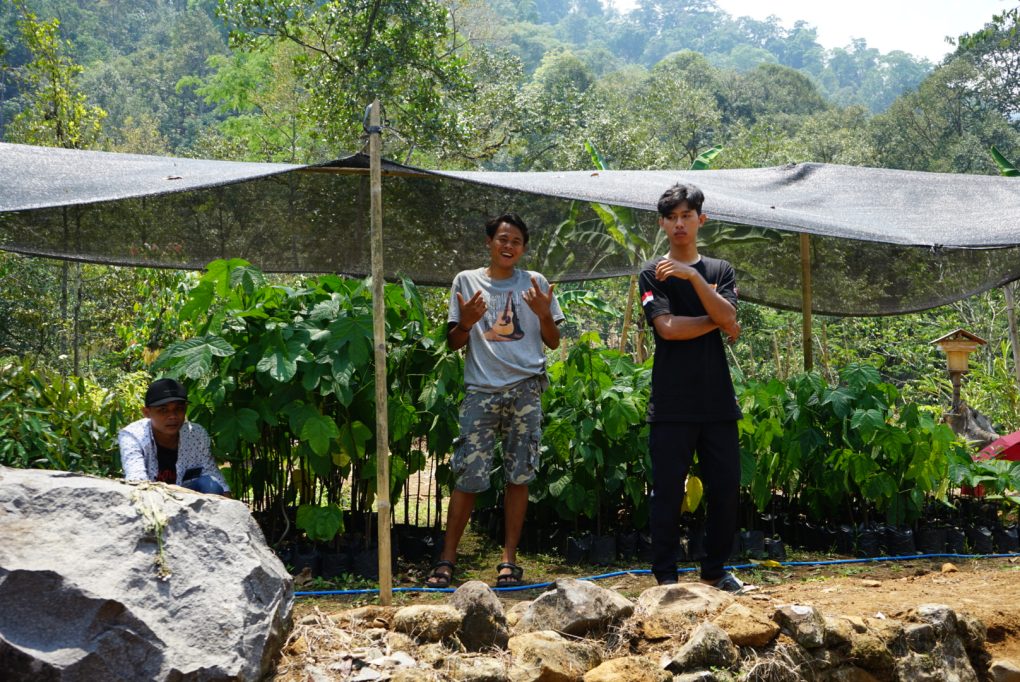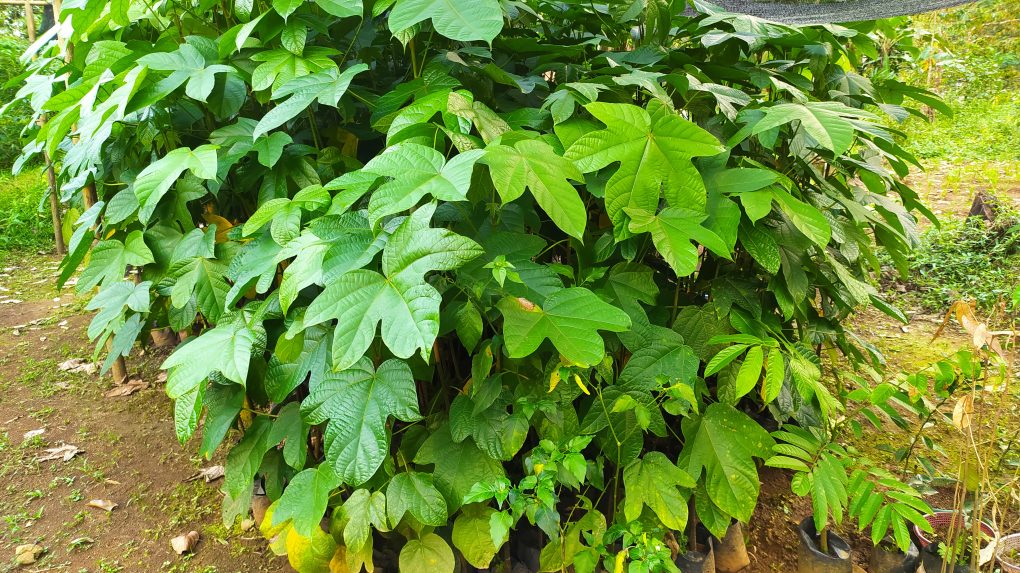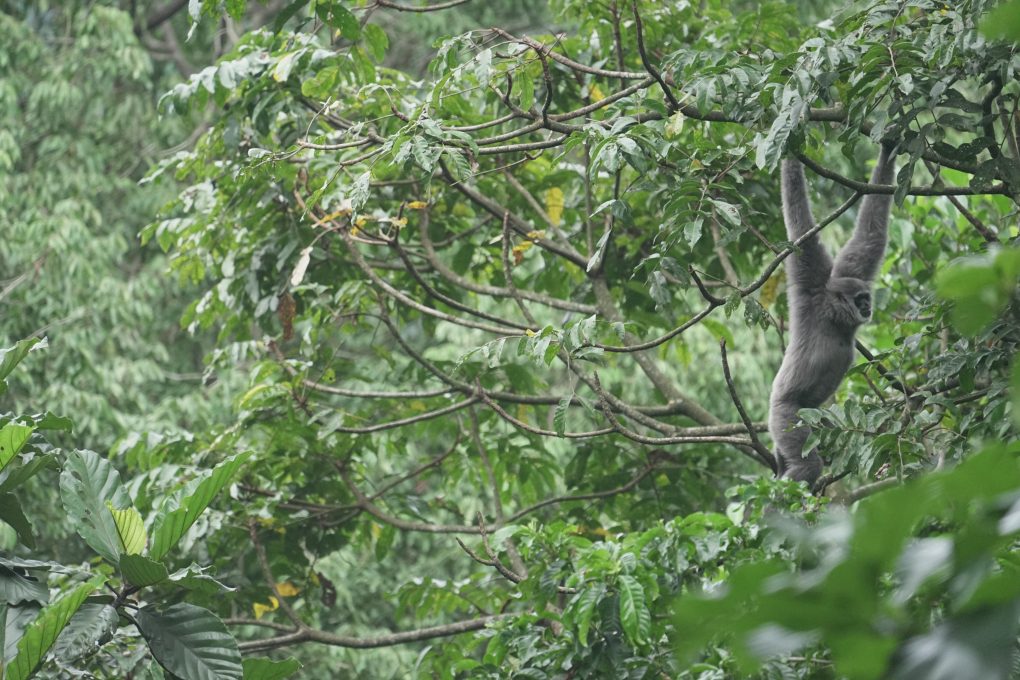by Sidiq Harjanto
The dry season in 2023, which is marked by the el-nino phenomenon, has an impact on water shortages in various regions. No exception was also felt by the community at our project site Mendolo Village, Lebakbarang District. In Mendolo Wetan Hamlet, the water supply through Pamsimas-Community based watter supply and sanitation program- for household needs is even insufficient. The water source on Mount Pawon is no longer able to irrigate about fifty houses. Fortunately, there are several small springs around the hamlet that still release water.
The people of Sawahan Hamlet, the majority of whom are durian farmers, are forced to fight for water to irrigate durian trees after the flowering season. If not followed by watering, young fruits may fall off without remaining. Some springs that appear in the grooves / tributaries that enter the Vishnu River have shrunk their discharge greatly due to the long drought.
Wisnu River itself is a body of water that divides Mendolo Village and is part of the Sengkarang Watershed. Being the lifeblood of the community, the existence of this river supports daily needs, supplies agricultural needs, and becomes a source of energy through micro hydro power plants.
Drought conditions have thickened the determination of the people of Mendolo Village to carry out planting movements in open areas. The forest tree nursery program managed by the Mendolo Young Farmers Association produced around 200 Pangium seedlings (Pangium edule) which began planting since the beginning of this year. This breed was chosen for two main reasons. First, the shoots are excellent at maintaining water management. Most of the springs in Mendolo are sheltered among Pangium giant trees.
The second reason is that the seeds can be used and have economic value. Known as Kepayang fruit , Pangium the seeds contain cyanide poison. Of course it is very dangerous if consumed directly. However, if processed correctly, the seeds are transformed into delicious preparations. People call it blibar. If fermented further for up to 40 days, kluwak, a typical black cooking spice used for local culinary of java, such as brongkos , gudeg, pindang tetel and rawon, used the kluwak for the main spice.
Create a wildlife corridor
By planting trees, many benefits can be reaped. Maintained water supply, for example. Trees have a function in protecting the soil from erosion and surface runoff, and are able to store water. Sustainable trees and forests are key to adequate water availability. Of course, there are many other benefits from planting trees and maintaining forests for our ecosystem.
Planting trees not only brings benefits to humans. Wildlife also benefits when the trees in the forest are still maintained. In the context of Mendolo, planting trees is intended to create corridors so that primate populations and various other animals remain interconnected. Swaraowa strongly supports the rehabilitation program of Vishnu River, considering that this area is also very important for various wildlife, such as: primates, birds, herpetofauna, fish, and many types of insects.
Inspired by a long-term community-based conservation program for howler monkeys in Belize (https://www.howlermonkey.org/), we facilitate farmers whose land is managed by rivers and tributaries to regreen their border areas. This boundary zone, as referred to above, will function as corridors that connect animal populations so as to avoid the threat of gene quality decline or genetic drift due to habitat fragmentation or isolation.
Furthermore, the community is expected to be an active part of the primate conservation movement itself. The forest area of Mendolo Village is a habitat for five species of Javan primates: Javan gibbon, Javan langur, rekrekan/ javan surili, long-tailed macaque, and Javan slow loris. With its rich primate species and growing awareness and community participation, the village has the potential to become a pioneer in the community-based primate conservation movement.
In addition to primates, the blue-collared kingfisher (Alcedo euryzona) is another priority species. This bird needs a river habitat shaded by natural forests. Habitat fragmentation and reduced vegetation cover pose serious threats to this species of bird with critically endangered status (CR). Therefore, caring for vegetation on river borders and rehabilitating open areas is a necessity in an effort to preserve this sensitive bird.
Beekeepers leads the movement
The beekeeper community in Sawahan Hamlet pioneered this planting movement. Of the approximately 20 farmers who gave up their land to be planted, some were stingless bee cultivators. Ecosystem balance is an important issue for beekeepers. That’s where the spirit of planting emerges. Planting trees means providing habitat, feed, and other vital needs for bee survival.
In line with Sawahan residents, the Podo Dadi Forest Farmer Group of Mendolo Wetan Hamlet, most of whose members are also beekeepers and forest honey harvesters, also plans to carry out similar breeding and planting activities. Previously, beekeepers in Mendolo Wetan had identified more than 30 forest tree species that were important in supporting the beekeeping efforts they had pioneered. Some types of forest trees are most favored by bees, including: sarangan, kayu babi, and Ngasari all are local names.
The bee keeping program was initiated by Swaraowa in 2017, aiming to foster sustainable economic alternatives for communities living on the edge of forest areas. Beekeeping is also predicted to be a medium to increase public awareness about the importance of caring for forests. As the dominant pollinating insect, the existence of bee populations is very valuable for the sustainability of the forest ecosystem itself.



